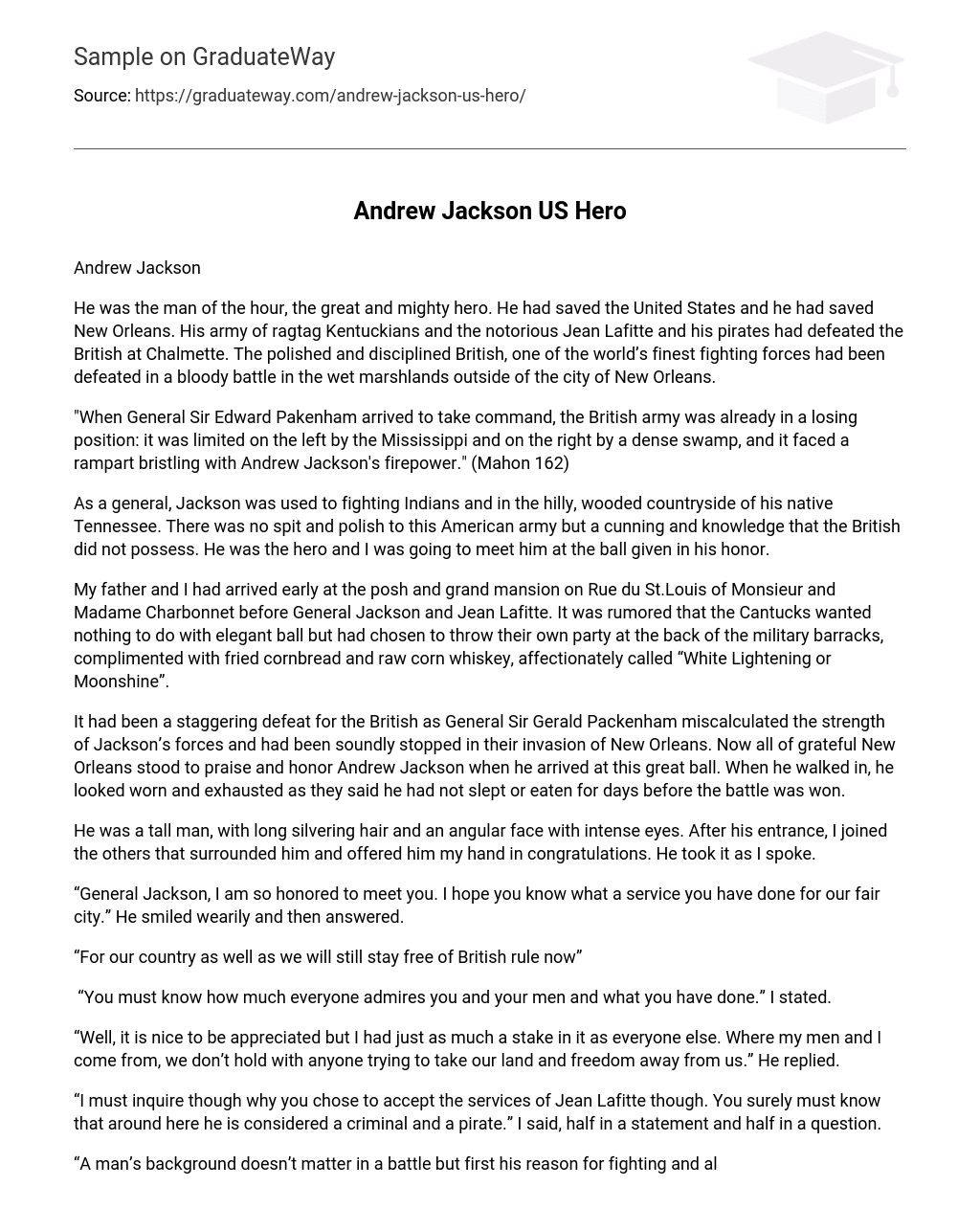Andrew Jackson
He was the man of the hour, the great and mighty hero. He had saved the United States and he had saved New Orleans. His army of ragtag Kentuckians and the notorious Jean Lafitte and his pirates had defeated the British at Chalmette. The polished and disciplined British, one of the world’s finest fighting forces had been defeated in a bloody battle in the wet marshlands outside of the city of New Orleans.
“When General Sir Edward Pakenham arrived to take command, the British army was already in a losing position: it was limited on the left by the Mississippi and on the right by a dense swamp, and it faced a rampart bristling with Andrew Jackson’s firepower.” (Mahon 162)
As a general, Jackson was used to fighting Indians and in the hilly, wooded countryside of his native Tennessee. There was no spit and polish to this American army but a cunning and knowledge that the British did not possess. He was the hero and I was going to meet him at the ball given in his honor.
My father and I had arrived early at the posh and grand mansion on Rue du St.Louis of Monsieur and Madame Charbonnet before General Jackson and Jean Lafitte. It was rumored that the Cantucks wanted nothing to do with elegant ball but had chosen to throw their own party at the back of the military barracks, complimented with fried cornbread and raw corn whiskey, affectionately called “White Lightening or Moonshine”.
It had been a staggering defeat for the British as General Sir Gerald Packenham miscalculated the strength of Jackson’s forces and had been soundly stopped in their invasion of New Orleans. Now all of grateful New Orleans stood to praise and honor Andrew Jackson when he arrived at this great ball. When he walked in, he looked worn and exhausted as they said he had not slept or eaten for days before the battle was won.
He was a tall man, with long silvering hair and an angular face with intense eyes. After his entrance, I joined the others that surrounded him and offered him my hand in congratulations. He took it as I spoke.
“General Jackson, I am so honored to meet you. I hope you know what a service you have done for our fair city.” He smiled wearily and then answered.
“For our country as well as we will still stay free of British rule now”
“You must know how much everyone admires you and your men and what you have done.” I stated.
“Well, it is nice to be appreciated but I had just as much a stake in it as everyone else. Where my men and I come from, we don’t hold with anyone trying to take our land and freedom away from us.” He replied.
“I must inquire though why you chose to accept the services of Jean Lafitte though. You surely must know that around here he is considered a criminal and a pirate.” I said, half in a statement and half in a question.
“A man’s background doesn’t matter in a battle but first his reason for fighting and also his ability to fight. Jean Lafitte had as much to lose as I did and his ability in war is well known. I could have not felt better about having anyone at my back as Mr. Lafitte, pirate or not.” Jackson explained.
I knew of Lafitte’s scandalous reputation but I also knew of his strategic knowledge of war fare, but yet, I had to agree with Jackson. New Orleans owed Jean Lafitte an honor as well as Andrew Jackson. Considering this, I said to Jackson.
“I do thank you both, General, as do all my fellow citizens and the country as well. You are a brave man and it will always be my great honor to have met you.”
Works Cited
Mahon, John K., “The Battle of New Orleans”, Journal of Southern History, Vol.67, 2001





